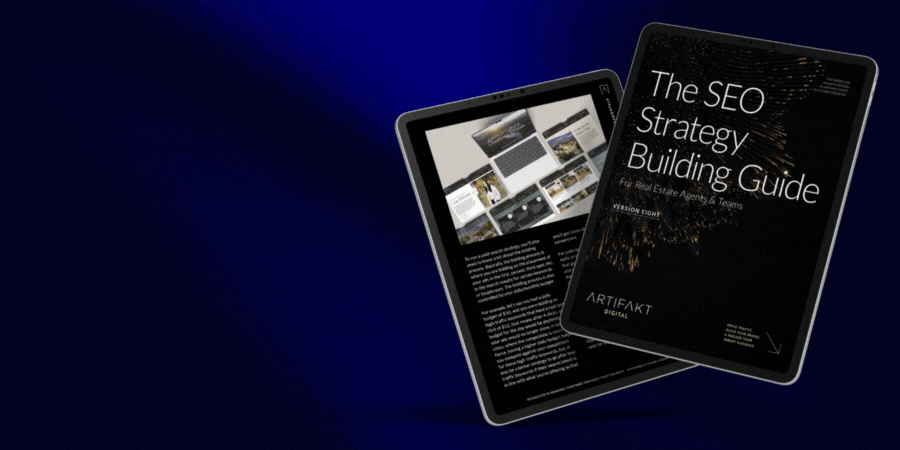Why You Need an External Link Building Strategy for Your Real Estate Website

As a modern real estate agent and marketer, a key part of your marketing strategy is going to be getting your website in front of the right people at the right time. And a big part of that should be investing in SEO to help your website rank higher in search results so that more people will find you, your business, and your content, and click through to it.
But that, in itself, is a complex strategy to build out.
And that’s because SEO complex. A solid, well-rounded SEO strategy is made up of a lot of moving parts, and one key element of it is your external link building strategy, which involves building the number of inbound links to your website.
Link building is tough. It requires patience, knowledge, determination, confidence, psychology, even a little manipulation; it takes a number of skillsets to do it successfully.
But what exactly is external link building? Simply put, it’s the process of building backlinks to your website from other websites with the goal of your content and your website appearing to be more authoritative.
★ There are 2 main types of link building: internal and external. In this post, we’re primarily talking about external link building, but if you’re interested in internal link building, this post right here about pillar pages is a good place to start.
Why is Link Building Important?
As Moz (one of the online authorities of SEO) puts it: search engines treat links as votes for popularity and importance on the web. Meaning, the more links you have, the better, but it’s a little more complicated than that.
When it comes to external link building, quality always wins over quantity. Meaning, it’s better to have fewer quality links than a ton of links that are less authoritative.
Here’s a good example of how quality works when it comes to external link building:
If you and I are both real estate agents with real estate-focused websites, and you link to my website, then that’s great; but if the real estate news website Inman links to my website, that’s much more valuable because the Inman website likely has a lot of domain authority than yours, so it’s probably more authoritative than your website (you can learn more about domain authority right here).
If you have a lot of qualitative backlinks to your website, then basically, Google (and other search engines) believe that your website is more important (authoritative) than others, so you have a better chance of showing up in search results. And that’s because, overall, all Google wants to do when someone makes a search is give them the best, most meaningful result possible. If your website has a lot of authoritative links, Google is likely to think that’s your website instead of the competition’s.
That’s also one of the reasons that having a strong blog strategy is important. If you have a lot of content written, and it ranks well in search results, then there’s a good chance that other people will find your content and link back to it in their content to give it more authority.
Have you ever got an email from someone offering to write a blog post for you for free? Did you ask yourself, why would someone write content for free for me? In all likelihood, they’re not writing it for free, but in exchange for a link. It’s one of the oldest techniques for getting external backlinks. In SEO and digital marketing, backlinks from qualitative websites are gold and worth putting in some effort to get!
Why Worry About Quality?
As mentioned above, quality is absolutely key when it comes to building an external link strategy, but why is that? If the number of links indicates how popular your website is, why can’t I just focus on getting as many links as possible, regardless of where they come from?
That’s because just as search engines consider the number of quality links to your website to be a factor in how important it is, the number of low quality links can also indicate that it’s not important.
Basically, less-authoritative, low-quality links are easier to get, so it’s a bit like cheating the system, and search engines know it. There are even entire websites (referred to as link farms), whose sole purpose is just to provide a link (some even in exchange for money).
So what about purchasing links? What if you were to buy backlinks online by outsourcing your link building strategy to a service or third-party website? That’s another bad idea simply because you never know if you’re hiring the right service to help; if you hire the wrong one, it’ll do more harm than good, and can contribute to permanent destruction of your SEO strategy. In the end, as search engines get smarter, they’re likely to be able to figure out that you took a shortcut.
If you build your link strategy around these low-hanging opportunities, you may see some success initially, but over time, when search engines find out (and they will), you can be permanently penalized in search results and in some extreme cases, ruin your SEO strategy entirely.
It goes back to the saying I always bring up: in real estate marketing, whatever is harder and more work to do is likely going to give you the best result.
And that completely applies here. Building a complex external backlink strategy focused on quality over quantity is a lot harder, but also, a lot more beneficial in the long run.
It’s Complex, But Focus on the Basics
Just like SEO is complex, external link building is complex, and there’s a lot to know. A link building strategy can go a lot deeper than just getting links from external, qualitative websites.
So even if you don’t have the time to do a deep dive into complex backlink techniques, but instead, you just concentrated on building external links from qualitative websites, then that’s a great strategy to focus on.
Want to learn more about SEO and get more traffic to your website? Our SEO Strategy Building Guide is a mix of curated content and self-guided workbook that will help provide insight on how you can build and implement a modern SEO and overall search strategy.





















